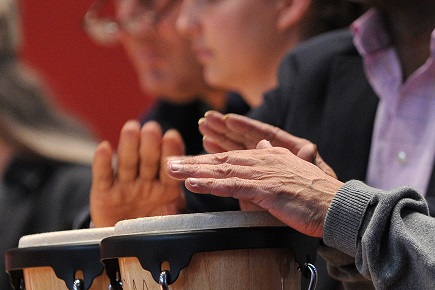RCM Finds Drumming Has Positive Impact on Mental Health
Monday 21 March 2016
Research by the Royal College of Music has found that drumming has a positive impact on mental health, with a 10-week programme of group drumming reducing depression by as much as 38% and anxiety by 20%.
A preliminary study, published in Psychotherapy and Psychosomatics, and a controlled study, published in PLOS ONE, also revealed that a 10-week programme of group drumming can improve social resilience by 23% and mental wellbeing by 16%.
Carried out among 76 mental health service users in London across two studies, the study involved participants taking part in 6- and 10-week programmes of group drumming workshops led by a professional drummer and supported by students from the Royal College of Music. Participants completed validated questionnaires measuring depression, anxiety, stress and mental wellbeing, and saliva samples were analysed to test their biological responses. The research is the first of its kind to bring together psychological and biological results to paint a more complete picture of how making music benefits mental health services users. The benefits were still evident three months later, suggesting that drumming could be an economical yet effective intervention for mental health service users.
Research over the last two decades has demonstrated that many mental health conditions, including depression, are linked to inflammation in the immune system. Analyses of immune function from saliva analyses in the research showed that drumming was also associated with a shift away from an inflammatory immune profile; a finding parallel to results from studies involving anti-depressant medication and psychotherapies.
Aaron Williamon, Professor of Performance Science at the Royal College of Music, commented: ‘Research into the psychological and biological benefits of psychosocial interventions for conditions such as anxiety and depression has increased markedly in the past decade. Our study shows that making music can be a powerful tool for promoting mental health and contributes to a wider evidence base around music and wellbeing.’
The Royal College of Music study was the first project of the new Centre for Performance Science, a Royal College of Music partnership with Imperial College London, and carried out as part of ‘Creative Practice as Mutual Recovery’, a project funded by the UK’s Arts and Humanities Research Council.
For further information please see our press release.








